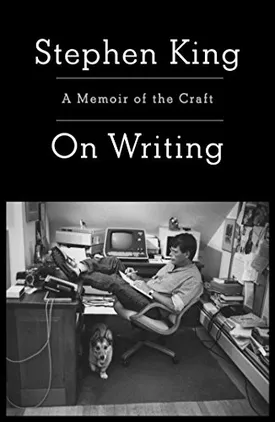On Writing: A Memoir Of The Craft by Stephen King
Stephen King’s ‘On Writing: A Memoir of the Craft’ is a fascinating look into the life and writing of the renowned horror novelist. Part biography, part instructional guide, this book covers Stephen King’s journey from humble beginnings in Maine to becoming one of the world’s most prolific writers. King offers an honest, humorous and often inspiring account of his early struggles, eventual successes, and hard-earned learnings about the craft of writing itself.
The memoir begins with an introduction from King, in which he talks about why he decided to write the book. King explains that he often gets asked by aspiring authors how to become a writer, and although he believes that there is ‘no magic formula’, he wanted to pass on the lessons he had learned to ‘the legion of writers out there’. King then explains how he organises the book, and how readers can benefit from it, before going on to the start of the memoir proper.
King recounts his humble beginnings during the 1950s and 1960s in small-town Maine, exploring the places and events that influenced his writing. He reflects on his early love of reading, giving a vivid description of the library in his local town and the books that intrigued him. King also speaks about his early efforts to write, including his first novel ‘Carrie’ which eventually became a huge success and gave him the confidence to develop and hone his craft further.
The next section of ‘On Writing’ deals with the process of writing itself. King talks about the importance of ‘Basics’ such as grammar, spelling and punctuation and gives advice on the rewriting process. He also provides useful tips on becoming a better writer such as writing regularly, keeping a journal and not being afraid of making mistakes.
The book then moves on to King’s main observations, thoughts and advice on writing. He explains that ‘substance, not form’ is important, and encourages writers to ‘kill their darlings’ - get rid of the superfluous bits in favour of the essentials. He is also keen to focus on the flow of the piece, and considers that good writing should take the reader on a journey.
One of the most interesting sections of ‘On Writing’ relates to King’s insight into the psychology of writing. He speaks passionately about the importance of stories in helping readers to connect emotionally, whilst emphasising the need for the heartfelt, honest stories to be the ones that inspire and linger in the mind. King also shares his thoughts on how to make writing enjoyable, and reveals how, despite his success, it is his enjoyment of writing that keeps him motivated and inspired.
Finally, King offers advice and encouragement to aspiring writers. He urges them not to be discouraged and that success is achievable and should be celebrated. King closes the book on an uplifting note, and despite his successful career, emphasises the importance of continuing to learn and strive to improve.
All in all, ‘On Writing: A Memoir of the Craft’ by Stephen King is an interesting, informative and inspiring book for any writer. A must read for beginners and a refreshing reminder for the more experienced, this valuable insight into the mind of a masterful wordsmith is a great addition to any library.

